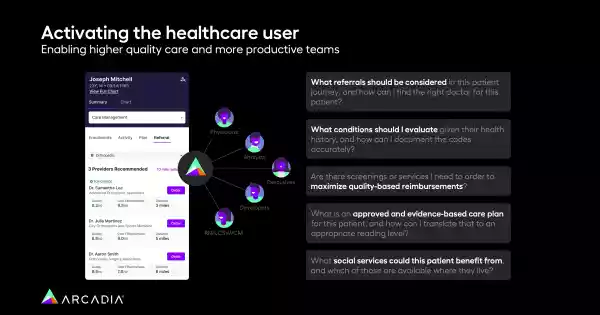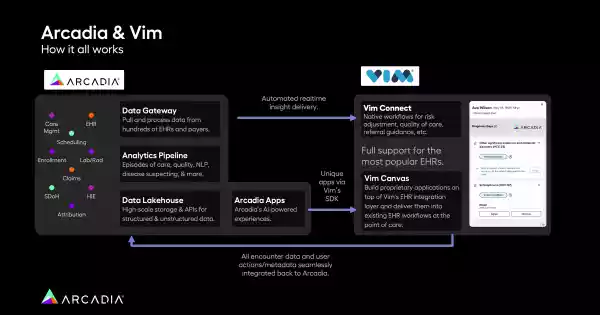5 ways to enable higher quality care and more productive teams
A roadmap for value-based care organizations to reduce administrative burden and drive better outcomes in just a few clicks.
Value-based care teams can deliver better care and work more efficiently by reducing administrative tasks and utilizing timely data. This article presents five practical strategies to improve patient care and team productivity by delivering the right information at the right time at the point of care. It covers methods for delivering AI-driven insights within EHRs to streamline the referral process, ensure accurate medical coding, identify preventive services, create understandable care plans, and integrate social services. These steps are designed to provide healthcare professionals with a clear plan to improve outcomes using available digital tools.
We’ll also share an exciting new partnership that helps alleviate the burden of condition suspecting, coding, and maximizing reimbursements by delivering AI-driven insights to clinicians at the point of care. But first, let’s discuss five ways healthcare organizations can enable their teams to deliver better care and improve efficiency:

1. Referral management: A crucial step in providing comprehensive care is the ability to refer patients quickly and accurately to specialists who meet their health needs. Having this information in the EHR not only streamlines the referral process but also helps prevent adverse health outcomes by ensuring patients receive the most appropriate care in a timely manner.
2. Condition and coding suggestions: Accurate documentation and coding are essential for a detailed and comprehensive patient health record. By integrating smart analytics in EHRs, healthcare professionals can receive suggestions for proper coding and documentation that align with the patient’s health history. This ensures that patient records are as thorough and accurate as possible, facilitating better care and compliance. The more comprehensive the record, the better value-based care organizations can document their care to CMS (and receive the reimbursements they’re owed).
3. Maximize quality-based reimbursements: Preventive care is a critical component of value-based care, helping to detect health issues before they become serious. Integrated EHR data helps users detect possible screenings or services that would offer preventive care and maximize quality-based reimbursements for value-based care organizations.
4. Deliver evidence-based care plans: The right information can help care teams find or form an appropriate, evidence-based care plan, and critically, it helps them translate it in clear terms so the patient understands the next steps and follows their course of treatment for optimal results.
5. Surface social service benefits: Social services can be one of the most powerful tools to mitigate SDoH factors, and integrating social determinant data in the EHR ensures providers have this information at their fingertips. Providers can access available offerings that make sense based on a patient’s chart. By identifying locally available social services that align with the patient’s needs, healthcare providers can offer a more holistic approach to care that extends beyond the clinic or hospital setting.
How actionable insights in the EHR drive quality and productivity in healthcare
Senior Director of Strategic Partnerships Nick Kamireddy and Vim’s Senior Director of Business Development Timothy Barry recently discussed how a new partnership improves documentation and reimbursements specifically. Watch the video above to learn how Arcadia and Vim are helping healthcare teams perform at the top of their licenses by delivering aggregated, AI-driven insights at the point of care.

This partnership allows healthcare organizations flexible ways to deliver AI-driven tools, such as Arcadia's clinical co-pilot, Arcadia SageAI™, into EHRs. This is possible through Vim’s middleware, which offers low-lift EHR integrations and simple deployment to providers across a network. Arcadia SageAI leverages the high-quality aggregated dataset Arcadia is known for to generate patient summaries, develop care plans, and deliver social service recommendations. One healthcare organization using Arcadia SageAI reduced the time needed to prepare for a patient visit by more than 20%.
Read the press release or schedule a demo to learn more about this exciting new partnership.
